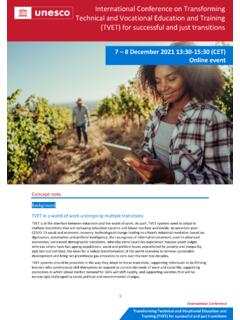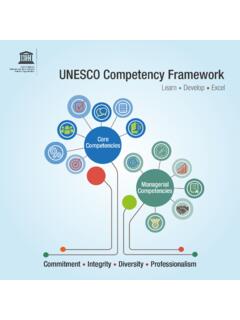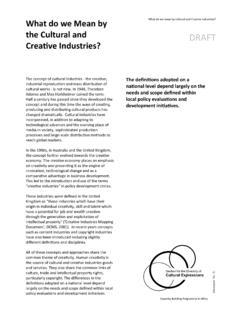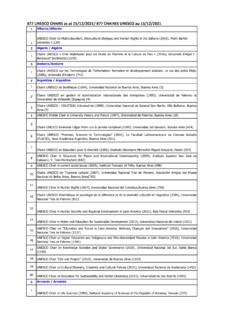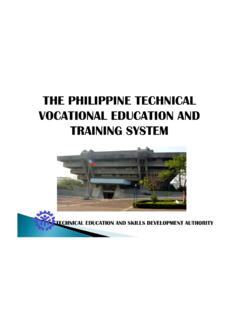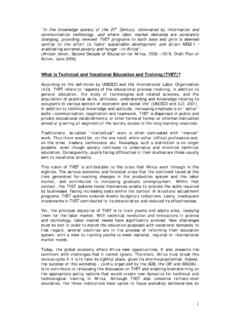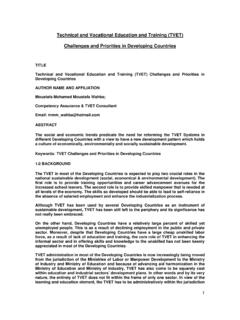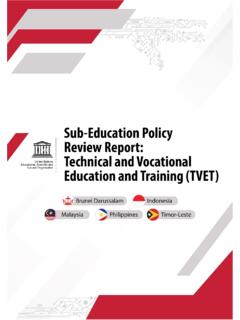Transcription of Strategy for Technical and Vocational Education and ...
1 United NationsEducational, Scientific andCultural OrganizationTechnical and Vocational Education and Training ( tvet ) (2016-2021) Strategy forFor more information, please visit: SectorUnited NationsEducational, Scientific andCultural OrganizationPublished in 2016 by the United Nations Educational, Scientific and Cultural Organization 7, place de Fontenoy, 75352 Paris 07 SP, France UNESCO 2016 Cover illustration: Baseline Arts and UNESCO Inside illustrations: Designed by UNESCO-UNEVOC/A. MejiaSource: Earth Vector - Creative Commons vecto2000 - (edited in composition) Flat urban landscape and building vector 03 Creative Commons welovesolo +urban (edited in composition) Designed and printed by UNESCO Printed in France ED-2016/WS/24 UNESCO Strategy for Technical and Vocational Education and Training ( tvet )
2 2016-2021support the e orts of Member States to enhance the relevance of their tvet systems and to equip all youth and adults with the skills required for employment, decent work, entrepreneurship and lifelong learning, andcontribute to the implementation of the 2030 Agenda for Sustainable Development as a whole. 3 Pillars of Priority AreasDid you know Strategy aims to:Rising youth unemployment is one of the most signi cant problems facing economies and societies in today s world, for developed and developing countries new jobs need to be created to absorb themillion youth currently unemployed and the Over the next decade, at leastmillion new annual entrants to the labour workers worldwide are in vulnerable decent work is a signi cant challenge for youth.
3 1 Despite progress and economic growth, inequalities and poverty persist in many parts of the world. 1 - ILO: World Employment and Social Outlook: Trends 20152 - ILO: Research News 1/2015On average, for countries in which data is available, the wealthiest 10% earn 30-40% of the country's total income. By contrast, the poorest 10% earn around 2% of the total global unemployment rate (%)The global labour force participation rate (%) - ILO: World Employment and Social Outlook: Trends 20154 - ILO: Global Employment Trends 20145 - ILO: Working Towards Sustainable Development 2012 For all countries, climate changeirreversible threatgreener economy.
4 15-60millionnew jobscould be generated globally over the next two decades through the transition to a All Member States have priorities for transition to green economies and climate resilient an urgent and potentially Fostering youth employment and entrepreneurshipUNESCO will support Member States to conduct Policy reviews and tvet reformsUNESCO will mobilize cooperation of di erent stakeholdersUNESCO will support Member States to design e cient and e ective tvet funding strategies Promoting equity and gender equalityUNESCO will conduct policy advice and capacity-building programmesUNESCO will encourage exchange and dissemination of knowledgeUNESCO will promote targeted policy measures for disadvantaged groupsFacilitating the transition to green economies and sustainable societiesUNESCO will promote green skills for a smooth transition to greening economiesUNESCO will foster cross-sectoral approaches of TVETUNESCO will support Member States to leverage digital technologies and close the digital
5 DivideUNESCO will support measures enhancing women s and girls access to relevant tvet programmes and providing equal opportunities in the world of workTo maximise the outcomes of the Strategy s priority areas, UNESCO will help Member States:to identify and anticipate skills requirements to inform tvet policies, strategies and programmes and to create multi-level and multi-sectoral stakeholder platformsby facilitating the debate on recognition of skills and quali cations, including across borders, as well as building learning pathways in a lifelong learning perspectivein monitoring progress towards SDG4 and related tvet targets with a framework of key indicators2345 Designed by UNESCO-UNEVOC/A.
6 Mejia4 Strategy FOR Technical AND Vocational Education AND TRAINING ( tvet ) (2016-2021)I. CONTEXT 1. The international community has set an ambitious 2030 Agenda for Sustainable Develop-ment. It calls for an integrated approach to development which recognises that eradicating poverty in all its forms and dimensions; combating inequality within and among countries; preserving the planet; creating inclusive and sustainable economic growth; achieving full and productive employment and decent work for all women and men; and ensuring full gender equality and fostering social inclusion, are interdependent.
7 2. Education and training are central to the achievement of the 2030 Agenda. The vision of the Incheon Declaration: Education 2030 is fully captured by Sustainable Development Goal 4 Ensure inclusive and equitable quality Education and promote lifelong learning opportunities for all . Education 2030 devotes considerable attention to Technical and Vocational skills development, specifically regarding access to affordable quality Technical and Vocational Education and Training ( tvet ); the acquisition of Technical and Vocational skills for employment, decent work and entrepreneurship; the elimination of gender disparity and ensuring access for the vulnerable.
8 In this context, tvet is expected to address the multiple demands of an economic, social and environmental nature by helping youth and adults develop the skills they need for employment, decent work and entrepreneurship, promoting equitable, inclusive and sustainable economic growth, and supporting transitions to green economies and environmental In the last six years, UNESCO implemented a Strategy for TVET1 (2010-2015) which aimed at strengthening support to Member States to improve their tvet policies and systems.
9 The Shanghai Consensus,2 adopted in 2012 at the Third International Congress on tvet , provided a vision to connect the analysis of tvet systems with intended development outcomes, and indicated key recommendations for tvet system reform and policy development. 1 See: See: and Vocational Education and Training ( tvet ) (2016-2021) Strategy forSTRATEGY FOR Technical AND Vocational Education AND TRAINING ( tvet ) (2016-2021)54. The vision and policy areas of the Shanghai Consensus helped to inspire the revision and drafting of the Recommendation concerning Technical and Vocational Education and Training (2015), which was developed in close coordination and synergy with the newly revised Recommendation on Adult Learning and Education (2015).
10 Both Recommendations provide impetus for work in the field of lifelong learning and are crucial to accompany the implementation of Education An evaluation of the Strategy3 was conducted in 2014-2015. UNESCO s work was found to be widely appreciated. UNESCO s expertise in providing policy advice, capacity-building and conducting policy reviews is valued at the national level, while its conceptual and normative work constitute a specific added value that helps Member States to set up and improve their tvet policies and systems.
